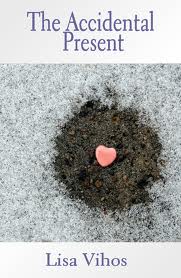Book Review
Lisa Vihos, The Accidental Present, Finishing Line Press, 2012
Reviewed by Tim McLafferty
The Accidental Present is an offering of twenty two poems, many of which contrast everyday life against larger concepts that must be individually confronted and defined. In these poems, Vihos writes both her experienced physical life and her sensed inner-life, blending them into a poetry that reveals both the seen and the unseen.
Everything After
Everything that happened
happened after
happily ever after.
Before now and then,
before time began
in a place we had forgotten.Everything that was now
was in the ever after,
that ringing sound of laughter,
brittle voices in autumn sun.
Let’s go, they said, let’s run
down to the lake, it’s fun.Time is only what we think.
Thirty years go by, just blink
and you will find yourself
right here where you started
just here where your heart is,
this place you never parted.We could stand alone or not,
we could blossom, we could rot—
there is no rhyme or reason.
I only know that time stands still
when I hold your hand until
the coming of the season.
The first stanza firmly scrambles any notion of time, and our existence, or multiple existences within it. “Time is only what we think” further stresses that we are grappling with something large and possibly incomprehensible. “I only know that time stands still / when I hold your hand…” Here, we see the play between the perceived real, and the created concept, which in this case is the body, the hands touching—the grounding relationship, within the arc and enigma of time.
In many of these poems, the body is primary as our basis of real and appears repeatedly— the body created, born, touching others, itself, and things, the body aging, perceptions of beauty, and the body as one gender or the other.
In "Loveliness," we find the body touched and touching, and love as sacrament—
Let the minding
and reminding of loveliness
be a sacred act,one best undertaken
in silence
on a rainy Sunday.Place your hand
on the body’s surface
and follow the contour…
In the title poem, "The Accidental Present," insight is achieved, or remembered, via the breaking of a much-cherished dish, and finding the maker’s mark on a shard:
we find a shard with an address label on the back,
the factory in which the plate was made, a reminderthat even broken things announce new life, and within
each thing dead or destroyed, creation is already written.
Like the comfort of human touch, there is comfort in the knowledge that all things bear the elements of future things—new life and regeneration. This is one kind of immortality, and also a reminder that what we are made from is borrowed material. This faith in life is again shown in the poem "Orchid"—
The orchids fell away
and left two dry sticks.I kept them by the window
all through the winter.There were those who scoffed,
faithless in the ways of death.But who laughs now?
Only me and the new blossom.
In fact, seed, growth, regeneration, and the naturalness of the life cycle, are common themes woven throughout this collection of poems. In many, Vihos seeks to understand and accept herself, her changes, and her physical mortality, with grace while choosing to live optimistically.
Spiritual immortality remains a possibility—a ghostly realm, and a God who may or may not be watching us, though is certainly waiting for us.
Showing more than a passing interest in poetic form and rhyme, Vihos presents a Shakespearean sonnet, "One Man’s Tragedy"; and a haunting sestina, "Ghosts," which summons reveries of a past, possibly young, and certainly passionate love and lovemaking in a car parked on a suburban street. Time has blurred the image of this lover, passed from her life, or life itself, and she writes, “I dream of you from my car seat. / I can’t see your face for your hair; / I’d like to reach and part it with my hands.” Soon followed by this ghostly line, “I’d let you live behind my hair…”
I found The Accidental Present to be interesting not only for the craft and creativity of Lisa Vihos, but also for her efforts to comprehend herself and the space and time she moves in.
Tim McLafferty lives in NYC and works as a drummer. He has played on Broadway in Urinetown, Grey Gardens, and many other interesting places. His work currently appears in many fine journals, including Forge, Painted Bride Quarterly, Pearl, Portland Review, and Right Hand Pointing. Visit timmclafferty.com.


